• Aprenden por interacción social a través de la imitación, es fácil ver que enseñamos a los niños pequeños a hablar a través de repetirles las palabras, ellos las oyen y las imitan;
• Luego viene el reforzamiento, que se genera si la palabra obtiene buenos resultados o la respuesta esperada, entonces procederá a repetirlas y a fijarlas en su cerebro.
• En consecuencia se estimulan las estructuras lingüísticas innatas, (que son las que cualquier humano tiene al nacer, es decir las estructuras mentales requeridas para la adquisición del lenguaje a las que hacía alusión Chomsky bajo la denominación de precursores mentales).
• Luego se produce el desarrollo cognoscitivo, que implica que el aprendizaje del lenguaje sea directamente proporcional al desarrollo cognoscitivo previo. En otras palabras, cada nuevo elemento del habla (palabra, sintaxis, pronunciación, etc.), no aparecerá antes de que el niño adquiera el concepto con el cual está vinculado.
Desafortunadamente, Genie estuvo aislada y carente de todos estos estímulos en el período crítico, y en consecuencia no pudo aprender a hablar correctamente, perdiendo dicha capacidad. Es decir, cuando un niño que no aprende a hablar correctamente antes de los 10 años de edad, difícilmente podrá hacerlo posteriormente, afectando otros aspectos de su desarrollo, ya que el lenguaje en las edades más tempranas de la vida, debe hablarse primero, para luego aprenderse a escribir; y esto es fundamental que se haga bien, porque una correcta expresión oral y escrita, nos aporta la destreza y capacidad comunicacional suficientes, para pronunciar y manejar un léxico amplio que favorezca la comprensión, aprendizaje, construcción y expresión de conceptos e ideas.
Quería exponer estas consideraciones teóricas, pues son necesarias para comprender lo importante que es estimular y enseñar adecuadamente el lenguaje en los niños pequeños durante el período o ventana crítica del aprendizaje; pero llevando esto al terreno práctico, y en función a mi experiencia personal, puedo acotar que las siguientes acciones son muy enriquecedoras del proceso de adquisición de una lengua materna, ya sean esta una, dos o tres, pues estudios han demostrado que sí pueden adquirirse varias lenguas maternas; así que podemos hacer lo siguiente:
• Cuando los niños están comenzando a hablar, es necesario pronunciar las palabras adecuadamente, con buena dicción, pronunciación y coherentemente, de acuerdo a su significado; no deformadas con diminutivos u onomatopeyas o descontextualizadas. Esto hay que hacerlo de manera repetida, para que ellos, por imitación y asociación al concepto, las puedan aprender.
• Es necesario oír y hablar con nuestros niños, ellos recordarán esas conversaciones como experiencias gratas y valiosas por el resto de sus vidas y a la vez enriquecerán su desarrollo cognitivo y emocional. A mí no se me olvidan muchas conversaciones con mis padres.
• Leer cuentos antes de dormir es una forma genial de enseñarles a hablar y a la vez estimular su amor hacia la lectura, pudiéndose convertir en un hábito.
• Jugar con los niños es importante para que aprendan una lengua. Recuerdo que mamá jugaba conmigo con los tacos de madera a construir palabras y a pronunciarlas, o cuando me daba la sopa de fideos en la que venían letricas, ella construía palabras en el plato y así iba aprendiendo.
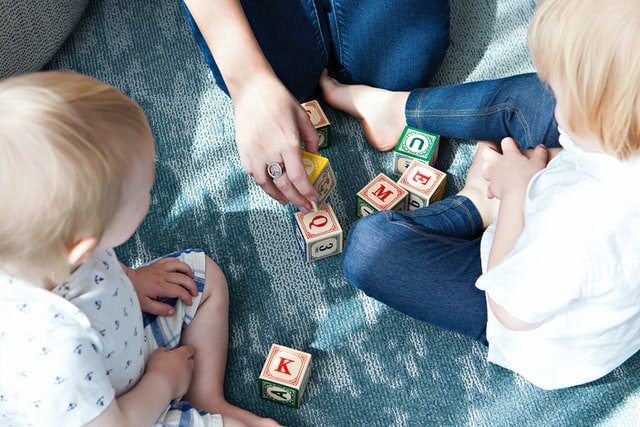
Photo by Marisa Howenstine on Unsplash
• Ya estando más grandes, podemos enseñarles una palabra nueva cada día, con ello estaremos ampliando su léxico y brindándoles más herramientas para su desarrollo integral.
• El ejemplo es la mejor forma de enseñar. Tener una manera adecuada de expresarnos, utilizando apropiadamente las palabras, pronunciándolas bien, evitando decir groserías, es una práctica muy significativa para que los niños aprendan a hablar y adquieran su lengua materna.
• En condición de emigrantes, pues el asunto se pone más difícil, ya que quizás no conocemos bien el idioma del país al que vamos a vivir; entonces no queda de otra que tratar de documentarnos al máximo y recurrir a los tutores y maestros para tratar de suplir esta falla. En el caso de mis nietas, su padre tuvo dos lenguas maternas, y en ambas se expresa también perfecta y fluidamente, así que es él quien les ha enseñado y guiado en este proceso. Ambas fueron afortunadas.
• Y para finalizar, les recuerdo la llave, la clave máxima de todo proceso de enseñanza aprendizaje: EL AMOR.
Muchas gracias por haber leído mi post, que sé bien es muy extenso. Espero les sea muy útil. Saludos y bendiciones.
 La imagen de presentación se encuentra disponible en el sitio web Unsplash.com y ha sido intervenida con la aplicación CANVA. El resto de las imágenes también están disponibles en Unsplash.com. Cada imagen tiene su respectiva fuente.
Me he documento y adquirido algunos conceptos, de la siguiente bibliografía:
La imagen de presentación se encuentra disponible en el sitio web Unsplash.com y ha sido intervenida con la aplicación CANVA. El resto de las imágenes también están disponibles en Unsplash.com. Cada imagen tiene su respectiva fuente.
Me he documento y adquirido algunos conceptos, de la siguiente bibliografía:
• Lenneberg, E. (1969) Fundamentos del lenguaje. Madrid: Editorial Alianza.
• Chomsky, N. (1992). El lenguaje y el entendimiento. Barcelona: Planeta-De Agostini.
La redacción de esta publicación es 100% ORIGINAL.
Este post es de mi autoría y propiedad, razón por la cual en caso de que su contenido sea referido en otra publicación, es INDISPENSABLE citar la fuente (Tarot911) y el link correspondiente. Gracias.
Para consultas privadas, puede escribir al correo: tarot911consultas@gmail.com o dirigirse a mi canal de Discord Tarot911#8370
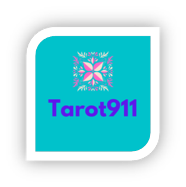
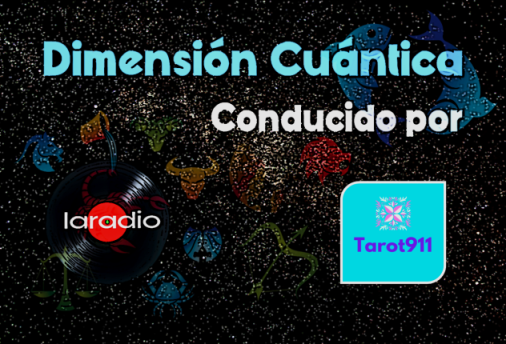
Ven a conocer el multiverso en el que vivimos, todos los jueves, a las 5:00 p.m. hora Venezuela en: DIMENSIÓN CUÁNTICA.
Un programa en el que haremos un recorrido por temas vinculados a la magia, lo paranormal, la astrología y la espiritualidad. Podrás encontrar tips astrológicos, tu horóscopo semanal y consultas exprés.
Presentado por @Tarot911, y sólo lo puedes disfrutar en el Discord de LaRadio.
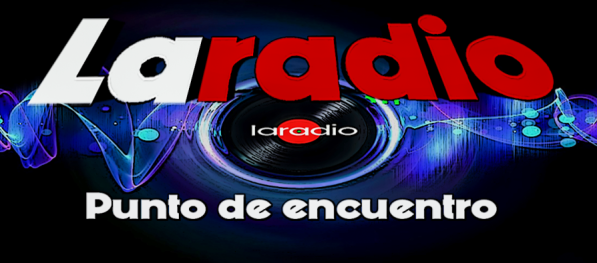
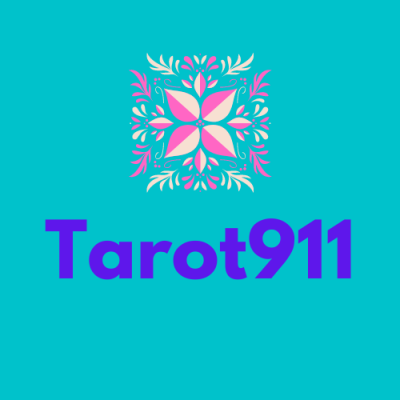
 CommunityIIDiscord
CommunityIIDiscord
ENGLISH
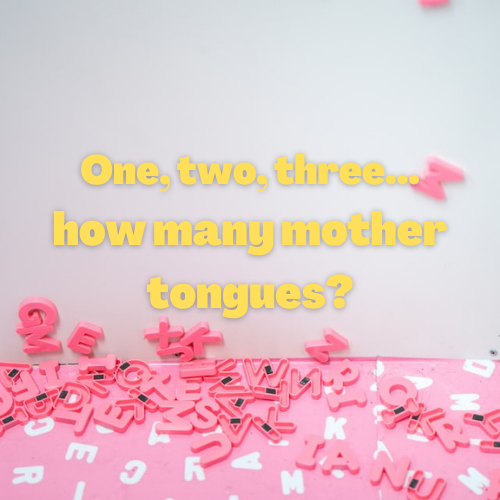 Photo by Jason Leung on Unsplash
Photo by Jason Leung on Unsplash
It is Saturday afternoon and my phone rings, I run to answer it, because I know they are calling from far, far away. On the other side I hear a little voice: “Olá! Vovo como você está ”(Hello! Grandma, how are you?), It is my youngest 4-year-old granddaughter, who speaks. Now, at this point I know what you're saying because my daughter translates it, because in the strange mix of Portuguese and Spanish that she speaks, (portuñol), there are some words that I can distinguish since they are similar to my language and my ear he has gotten used to this; but sometimes I get lost and I have no idea what she is saying, unless it is by video call and she shows me her toys, her books, her things and because she is so expressive, I can understand what she explains.
 Photo by Christopher Ryan on Unsplash
Photo by Christopher Ryan on Unsplash
With my older granddaughter there is no problem. She, 9 years old, speaks two languages perfectly and writes them too, although I think she is forgetting the grammar and spelling rules of Spanish a bit, because sometimes when she sends me messages, she gets confused and includes some words that are not correct written, but I want to think that you have the dictionary function of your phone activated, or that the contents of the English class you receive at her school are mixed up, and she is confused.
 Photo by Justin Heap on Unsplash
Photo by Justin Heap on Unsplash
I believe that for no one on planet Earth, nor throughout the Milky Way, it is a secret that my country, Venezuela, is experiencing a sad and accelerated process of multidimensional destruction. This is widely known and it is undeniable , because if things were good here, it would not have stampeded and in less than a decade, approximately 30% of the population, in order to take shelter in other parts , to try to survive or make a decent life in other countries. Within that 30%, there is practically 100% of my family, because everyone has had to migrate, and I am the one who remains here, the others are scattered across various continents; and among the migrants in my family there are several children, such as my granddaughters and nephews. Previously I shared this experience in another post, which I leave below, in case you want to have an idea of what forced migration means for those of us who stay. It's basically dying a little bit every day.
 Photo by Sébastien Goldberg on Unsplash
Photo by Sébastien Goldberg on Unsplash
So I think, I reflect for a long time and I see all the negative things that this phenomenon has brought us as a family, as a people, as a nation; bad things that are in sight or that are easy to infer and that undoubtedly discourage a lot; But to give me encouragement and hope, I also try to see what is positive about forced migration; And to be frank, I was surprised to see that it does bring few good things, such as learning other languages, and it may even be the case that migrant children have SEVERAL MOTHER LANGUAGES , such as as it happens with my two granddaughters.
 Photo by Hannah Wright on Unsplash
Photo by Hannah Wright on Unsplash
Now, what is the mother tongue? There are many definitions, but in a simple way we can say that the mother tongue is the language that we learn to speak during our first years of life and it is the one that structures our thoughts, that is, it is the code that our mental body uses to organize and create information. In other words, it is the language with which we think.
And when we say first years of life what period of time are we referring to? It's simple, this period ranges from 0 to 10 years of age, and there are multiple theories and studies that prove it; because it is up to 10 years of age that we can learn languages and easily incorporate them into our body or mental structure as a MOTHER TONGUE.
 Photo by Karl Fredrickson on Unsplash
Photo by Karl Fredrickson on Unsplash
Here come to mind the various theories that explain language acquisition, especially that proposed by
Noam Chomsky and his Language Acquisition Device (LAD), and that of Eric Lenneberg and his Critical Period Theory.
In essence, Chomsky in 1992, enunciated the theory called Language Acquisition Device, in which he stated that all humans have an innate tendency to learn language, it is as if a software was incorporated that is activated to learn to speak. He also indicated that there are certain components which he called cognitive precursors , which exist thanks to the complexity of the brain. These cognitive precursors are fundamentally of the sensory-motor type, and allow increasingly complex and particular linguistic structures to emerge and differentiate; and this is inherent to the human being because language is a vital ability to survive and is associated with the cognitive capacity of our species.
Likewise, Chomsky points out that at birth, the child has the anatomical structures that make it possible for him to speak (vocal cords, ear, brain), that is, the hardware to communicate; However, if any of these organs presents any malformation, it will be difficult for them to develop this communication capacity. Chomsky indicates that the starting point for the development of formal oral expression is from 4 years of age, because at this point the individual already has a base language, a set of words that can be expanded through the learning of complex syntax and grammar rules naturally, without the need for any inductive process. Simply put, children learn to speak because they bring software and hardware that are inherent to humans and that are activated due to proper social interaction with other humans. This analogy regarding hardware and software is a PERSONAL interpretation on my part, so I understand this theory.
As for Lenneberg, in 1969 he proposed a very interesting thesis, which he was sadly able to demonstrate in practice. His theory, which he called Theory of the critical period , has as its main premise that there is a temporary window for learning language or oral expression , which begins in early childhood and ends at the beginning of adolescence. After this time has elapsed, it is not possible that a human being who has lacked sufficient and adequate stimulus, can learn the language, neither spoken nor written; and this happens because it is in this critical period or window when the neurological faculties that allow learning the language develop; It is necessary that both internal and external conditions are linked to the development of speech, if this does not happen, the child will never learn to communicate; and social interaction is essential for such conditions to occur.
 Photo by Colin Maynard on Unsplash
Photo by Colin Maynard on Unsplash
Unfortunately, it was possible that Lenneberg could prove his theory because in November 1970, in Los Angeles, California, United States, a 13-year-old girl was discovered, who had been chained since she was 20 months old to a chair, and she was in a basement, cut off from virtually any human contact. This girl was called Genie (not her real name), and it was irrefutable proof of the Critical Period theory.
 Photo by Sam Moqadam on Unsplash
Photo by Sam Moqadam on Unsplash
Genie, being totally deprived of any stimulation and of any human contact, did not speak. Once she was treated by the country's Social Services, in order to be properly diagnosed and stimulated, she managed to learn some words and phonemes, but could never have coherence, since she did not understand the syntax of the language, since it was out of her reach to understand the grammar of language. This was because she did not receive sufficient encouragement during the mentioned critical period; and once that time has elapsed, the brain loses capacity in certain functional areas linked to language development. It is then, that by a process called neuroplasticity, this organ delegates this function to other areas that are available, but are less compatible with this task, being by extension less efficient for it.
It is necessary to indicate that the language in general terms can be learned in two ways: Explicitly and implicitly . The explicit way occurs when a tutor teaches us grammar and spelling rules of a language, and is the way we learn other languages when we are teenagers or adults. The implicit form is that which occurs in young children within the critical period or window of language learning, and this is produced by the following elements:
• They learn by social interaction through imitation, it is easy to see that we teach young children to speak through repeating words to them, they hear and imitate them;
• Then comes the reinforcement, which is generated if the word gets good results or the expected response, then they will proceed to repeat them and fix them in his brain.
• Consequently, innate linguistic structures are stimulated, (which are those that any human has at birth, that is, the mental structures required for the acquisition of language to which Chomsky alluded under the name of mental precursors).
• Then there is cognitive development, which implies that language learning is directly proportional to previous cognitive development. In other words, each new element of speech (word, syntax, pronunciation, etc.), will not appear before the child acquires the concept with which it is linked.
Unfortunately, Genie was isolated and devoid of all these stimuli in the critical period, and consequently she could not learn to speak correctly, losing this ability. That is, when a child who does not learn to speak correctly before the age of 10, it will be difficult for him to do so later, affecting other aspects of his development , since language at the earliest ages of life life, you must speak first, and then learn to write; and this is essential that it be done well, because correct oral and written expression gives us enough skills and communication skills to pronounce and handle a wide lexicon that favors understanding, learning, construction and expression of concepts and ideas.
I wanted to present these theoretical considerations, as they are necessary to understand how important it is to properly stimulate and teach language in young children during the critical period or window of learning ; But taking this to the practical field, and based on my personal experience, I can point out that the following actions are very enriching in the process of acquiring a mother tongue, be it one, two or three, as studies have shown that they can be acquired various mother tongues; so we can do the following:
• When children are beginning to speak, it is necessary to pronounce the words properly, with good diction, pronunciation and coherently, according to their meaning; not deformed with diminutives or onomatopoeia or decontextualized. This must be done repeatedly, so that they, by imitation and association with the concept, can learn them.
• It is necessary to listen and talk with our children, they will remember these conversations as pleasant and valuable experiences for the rest of their lives and at the same time they will enrich their cognitive and emotional development. I don't forget many conversations with my parents.
• Reading stories before bed is a great way to teach them to talk and at the same time stimulate their love of reading, and it can become a habit.
• Playing with children is important for them to learn a language. I remember that Mom would play with me with the wooden blocks to build words and pronounce them, or when she gave me the noodle soup with letters, she would build words on the plate and that's how I learned.

Photo by Marisa Howenstine on Unsplash
• Already being older, we can teach them a new word every day, with this we will be expanding their lexicon and providing them with more tools for their integral development.
• Example is the best way to teach. Having an adequate way of expressing ourselves, using words appropriately, pronouncing them well, avoiding swearing, is a very significant practice for children to learn to speak and acquire their mother tongue.
• As migrants, as the matter becomes more difficult, since perhaps we do not know the language of the country where we are going to live well; then there is no choice but to try to document ourselves as much as possible and turn to tutors and teachers to try to make up for this failure. In the case of my granddaughters, their father had two mother tongues, and in both he also expresses himself perfectly and fluently, so it is he who has taught and guided them in this process. They were both lucky.
• And finally, I remind you of the key, the ultimate key of all teaching-learning process: LOVE.
Thank you very much for reading my post, which I know is very extensive. I hope it is very useful to you. Greetings and blessings.
The presentation image is available on the website Unsplash.com and has been intervened with the CANVA application. The rest of the images are also available on Unsplash.com. Each image has its respective source.
I have documented and acquired some concepts, from the following bibliography:
• Lenneberg, E. (1969) Fundamentos del lenguaje. Madrid: Editorial Alianza.
• Chomsky, N. (1992). El lenguaje y el entendimiento. Barcelona: Planeta-De Agostini.
The wording of this publication is 100% ORIGINAL.
This post is my authorship and property, which is why in the event that its content is referred to in another publication, it is ESSENTIAL to cite the source (Tarot911) and the corresponding link. Thank you.
For private inquiries, you can write to the mail: tarot911consultas@gmail.com or contact the Discord: Tarot911#8370


Come discover the multiverse in which we live, every Thursday at 5:00 p.m. Venezuela time in: QUANTUM DIMENSION.
A program in which we will take a tour of topics related to magic, the paranormal, astrology and spirituality. You can find astrological tips, your weekly horoscope and express consultations.
Presented by @ Tarot911, and you can only enjoy it on LaRadio's Discord.
 )
)

 CommunityIIDiscord
CommunityIIDiscord
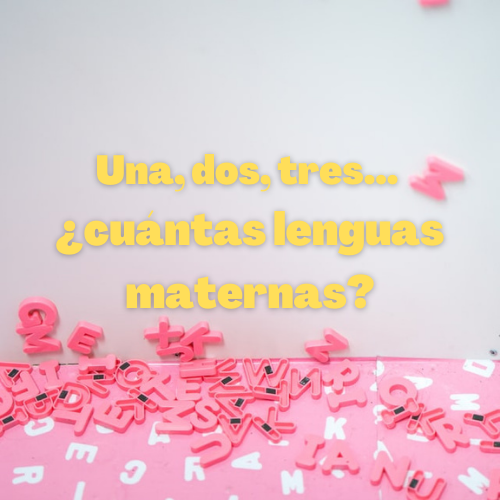













 CommunityIIDiscord
CommunityIIDiscord










 )
)
 CommunityIIDiscord
CommunityIIDiscord
Ofreces una reflexión muy pertinente y significativa sobre la migración y sus consecuencias culturales, en especial las lingüísticas. Tu compendio acerca de las relevantes tesis de Chomsky y Lennenberg está muy bien presentado, con claridad y precisión. Me parecen muy apropiadas tus recomendaciones para encaminar al niño en el aprendizaje de la lengua.Agregaría la lectura de poesía rimada, pues no solo despertará el sentido de la sonoridad y el ritmo, sino también el contacto con las palabras. Gracias por tu post, @tarot911.
PD: También yo me he quedado en Venezuela, y sé de los sinsabores y también de las satisfacciones que parientes y amigos experimentan en los lugares donde emigraron. Como han dicho, vivo en el inxilio.
!ENGAGE 25
ENGAGEtokens.I've featured your post in the @HomeEdders weekly curation.
Curated by @minismallholding on behalf of @HomeEdders.
Supporting home education and educational content. If you're a home educator, home educated or are thinking about home education, find out what we're about HERE.
You can join the community by clicking the subscribe button on Hive or Peakd.
please feel free to join us on discord.
Ohhh, this is a honor. Thanks!
This is how I found here. !ENGAGE 5 !invest_vote
@anli denkt du hast ein Vote durch @investinthefutur verdient!
@anli thinks you have earned a vote of @investinthefutur !
ENGAGEtokens.Wow, que interesante todo lo que expones y sobre todo por lo valioso que es conocer y aprovechar la ventana del tiempo de aprendizaje de los niños. Ciertamente existe una generación que debido a la migración tendrán la ventaja de dominar otra lengua, pudiéramos decir algo bueno de la experiencia de salir del país natal. Gracias por compartir en en el programa Encuentro de talentos, y te invito a usar la etiqueta #palnet. Buena vibra.
Ohhh, es un honor que hayas pasado a leer mi post @angelica7, y que también lo comentes y votes. Creo que es importante tener noción respecto a las teorías del desarrollo, pues este conocimiento nos brinda herramientas adicionales para hacer más eficiente nuestra labor como padres, abuelos, tutores; además, en mi caso, me permite conocer más profundamente la naturaleza de las personas, y de acuerdo a mi concepto de anatomía multidimensional del ser humano, me permite también comprender el funcionamiento de los diversos cuerpos que integran a los seres almados. Fue grato estar compartiendo con ustedes, gracias por tu gentil invitación, y ciertamente esto agradecida porque fueron cálidos conmigo cuando recién comenzaba en Hive. Aunque no pude estar hasta el final de la emisión me gustó mucho el programa. Tendré en cuenta tu sugerencia respecto a la etiqueta. Saludos y bendiciones.
!ENGAGE 25
ENGAGEtokens.Muy útil toda la información que nos compartiste en tu post, creo que es especialmente importante no solo por el tema de migración, sino también por un tema de necesidad para todos frente a este mundo globalizado que cada día más va generando mayores interconexiones y vinculaciones entre personas con diferentes lenguas maternas.
Muchas gracias por compartir tan interesante información.
Un abrazo 🤗
Hola, que bueno que estés por aquí @miriannalis y hayas leído este post también. Sí, he querido compartir parte de mi experiencia como persona que queda en el país pero viviendo la migración de los suyos, enfocándolo desde una perspectiva positiva, y además exponer parte de las teorías del desarrollo que considero son importantes para la comprensión del proceso de crecimiento de los niños. Me alegro te haya parecido interesante. Saludos y bendiciones.
Bendiciones amiga. Feliz día del amor y la amistad 💓🤗😘
!ENGAGE 25
ENGAGEtokens.Este es el primer post que leo de ti, que bueno que tocas el tema de la inmigración forzada, quizá luego lea también los otros post que están relacionados.
Este mismo tema lo he visto muchísimo en otros trabajos universitarios y sus conclusiones finales, uno de ellos habla precisamente de lo que tú mencionas aquí, es excelente aprender varios idiomas, en especial si aprovechas la plasticidad neuronal cuando eres un infante —risas— Me parece chévere que hayas mencionado a dos de los más grandes autores clásicos del lenguaje innato, Chomsky y Lenneberg, si bien ambos al principio se contradecían un poco debido a sus filosofías científicas, llegaron a la conclusión innata del desarrollo del lenguaje, me parece un buen resumen el que hiciste, me ha agradado leer tu post.
Espero seguir leyéndote, un placer, saludos.
Gracias por pasar a leer, comentar, votar y rebloguear, todo un honor tenerte por mi blog. La migración forzada es un triste episodio que nos ha tocado vivir a los venezolanos, luego de haber sido un país de puertas abiertas, que recibía sin remilgos y sin reparos a personas de todas las nacionalidades; ahora la cosa es al revés, nosotros somos los que salimos, (aunque algunos aún estamos acá). Aunque trato temas fundamentalmente esotéricos, siempre me ha intrigado cómo funciona la nave cuántica que somos nosotros, los seres almados; cómo nuestros cuerpos (físico, energético, mental y espiritual), se interrelacionan entre sí, y para poder comprender esa interface múltiple, la mejor forma es analizar todos los procesos subyacentes al desarrollo y aprendizaje; por eso me encanta leer y analizar todas esas teorías, hace más simple mi trabajo; pero más importante y fundamental aún, es poder optimizar la enseñanza de los niños de mi familia, y compartir este modesto conocimiento con los demás. Ciertamente, pareciera que Lenneberg y Chomsky fueran por veredas distintas, pero a la final, tal como expuse, existen notables coincidencias. Te extiendo una cordial invitación a mi programa "Dimensión Cuántica", el cual se transmite por el canal Discord de la comunidad LaRadio, todos los jueves, a las 5:00 p.m. hora Venezuela, puedes venir cuando quieras. Saludos y bendiciones.
Thank you for stopping by to read, comment, vote, and reblog, an honor to have you on my blog. Forced migration is a sad episode that Venezuelans have had to experience, after having been a country with open doors, which welcomed people of all nationalities without fuss and without qualms; now the thing is the other way around, we are the ones who left, (although some of us are still here). Although I deal with fundamentally esoteric subjects, I have always been intrigued by how the quantum ship that we are, the soul beings, works; how our bodies (physical, energetic, mental and spiritual), are interrelated with each other, and in order to understand this multiple interface, the best way is to analyze all the processes underlying development and learning; That's why I love reading and analyzing all those theories, it makes my work simpler; But more important and fundamental still, is to be able to optimize the teaching of the children of my family, and to share this modest knowledge with others. Certainly, it seems that Lenneberg and Chomsky were on different paths, but in the end, as I explained, there are remarkable coincidences. I extend a cordial invitation to you to my program "Quantum Dimension", which is broadcast on the Discord channel of the LaRadio community, every Thursday at 5:00 p.m. Venezuela time, you can come whenever you want. Greetings and blessings.
!ENGAGE 25
ENGAGEtokens.Un post muy educativo, toda la información sobre las lenguas maternas y la teoria, lo desconocia. ¡Feliz dia!
Ohhh, que bueno que te parece educativo. Existen muchísimas teorías del aprendizaje de las lenguas maternas, sin embargo, a mí me gustan mucho estas dos, pues me parecen muy acertadas. Es necesario que siempre prestemos mucha atención al proceso educativo y formativo de nuestros niños, pues la niñez es una etapa fundamental para estimular al máximo todas sus potencialidades intelectuales, cognitivas, físicas. Gracias por haber leído y comentado mi publicación. Saludos y bendiciones.
!ENGAGE 10
ENGAGEtokens.Vivo tu situación pues gran parte de mi familia y amigos han tenido que emigrar a otras latitudes, algunas incluso muy lejanas, pero lo que me gusta de tu post es que incluso a ese proceso puedas conseguir algo positivo y que pueda rescatarse.
Me parece interesante y genial que los que han emigrado a países de otras lenguas se vean en la necesidad de aprender y así conectarse con su entorno, de alguna manera es un crecimiento adicional al hecho de la madurez que deben estar adquiriendo por el hehco de estar en otro lugar.
Hay que buscarles el lado positivo a las malas experiencias, pues siempre, así sea en una porción mínima, la tienen. Asumir la migración forzada de la gente que amas es algo duro, pero la alternativa es esa: Identificar lo bueno y agradecerlo. Muchas gracias por pasar a leer y comentar. Saludos y bendiciones.
!ENGAGE 25
ENGAGEtokens.Congratulations @tarot911! You have completed the following achievement on the Hive blockchain and have been rewarded with new badge(s) :
Your next payout target is 1000 HP.
The unit is Hive Power equivalent because your rewards can be split into HP and HBD
You can view your badges on your board and compare yourself to others in the Ranking
If you no longer want to receive notifications, reply to this comment with the word
STOPCheck out the last post from @hivebuzz:
Con el apoyo de la familia.
Trail de TopFiveFamily
Muchísimas gracias por tomar en cuenta mi publicación. Saludos y bendiciones.
¡Excelente! Me siento honrada por haber sido seleccionada. Saludos y bendiciones.
Thank you for sharing your thoughts and memories! I want to share some of mine.
You used the term "forced migration". That led me to think want kind of forces are there. My grandfather was forced to migrate from today's Poland back to his mother in Berlin by the Red Army and then to Lower Saxony by the Wehrmacht. Now I think how fortunate it is to be forced on economic terms and not on warfare terms. Anyway I don't want to match those two. I have to tell lots of stories of migration in my own biography. I'm just not sure who is gonna write it.
The next thing I want to share is Harriet Pattison's work. She studied how people learn to read. And I am sure this is true for listening. http://www.freetolearnluxembourg.eu/Free_to_learn/EN_Harriet_Pattison.html
Then in 2006, with minor English skills, I visited Northern America und in 2010, way in my 30ies, I got surrounded virtually by a group of international people speaking, listening, writing and reading in English. Both incidents still feel like adding a second language to my tongue. Let's name this my travel's tongue. LOL The point I wanted to make here is, that I changed my attitude towards live by adding another language is this intensity.
So I suppose all this is not a matter of age but of patience and milieu. So migration definitely is a factor!
Great you see the plus side of it! So yes, LOVE is the most valuable message here!!
I'm late to vote, but not too late. I suppose it is to late for @tipu curate , but hey, let's give it a try. And then there is !ENGAGE 20 !invest_vote !WINE !JUICE !PUREWATER !FRESHAIR and maybe everyone even finds your writings on https://read.cash/r/anli soon. Take care!
Upvoted 👌 (Mana: 11/22) Liquid rewards.
Ohhh, what an energizing and beautiful comment. I think it's great that you told me part of the story of forced migration due to the war your grandfather had to experience. Without a doubt, the end of the Second War and the devastation carried out by the Red Army in that part of Europe was not easy, since they did many excesses. In the case of my people, it is not only the economic aspect that motivates people to emigrate, but the complete destruction of the country, the institutional anomie, the lack of a future, the absolute impunity and the lack of a social contract that currently exists; the fact that irregular and terrorist groups govern portions of our territory at their convenience; all this has exterminated the future of people, especially the youngest, and hence the need to migrate.
Regarding what you say about language learning as adults, certainly a cultural and social environment that puts you or forces you to communicate in that new language is a fundamental part of learning; However, in this post I wanted to emphasize how important it is to learn other languages during the window stage or critical period, because not only do you learn the language implicitly, but you can think in that language. In the case of my granddaughters, the youngest lives in environments where the language is Portuguese, but at home it is Spanish, so its mixture, but it is still very small, I know that little by little it will demarcate the two languages. The oldest of my granddaughters, she already spoke and wrote Spanish perfectly when migrating, and now she has been given Portuguese and English, so it is possible that they have several mother tongues.
I appreciate your invitation to that platform, I already signed up and I hope to share new content there as well. And this week I will read the article that you have shared with me on how to learn to read, one of the most complex and most important processes for humans. I am grateful for your deference, thanks for stopping to read and comment. Greetings and blessings.
Ohhh, que comentario tan energizante y hermoso. Me parece genial que me hayas comentado parte de la historia de migración forzada debido a la guerra que tuvo que experimentar tu abuelo. Sin duda alguna no fue fácil el final de la Segunda Guerra y el arrase que llevó a cabo el Ejército Rojo en esa parte de Europa, ya que hicieron muchos desmanes. En el caso de mi pueblo, no es sólo el aspecto económico lo que motiva a la gente emigrar, sino la destrucción completa del país, la anomia institucional, la falta de futuro, la absoluta impunidad y falta de contrato social que existe actualmente; el hecho de que grupos irregulares y terroristas gobiernen a su conveniencia porciones de nuestro territorio; todo eso ha exterminado el futuro de las personas, especialmente de las más jóvenes, y de allí la necesidad de migrar.
Con respecto a lo que dices del aprendizaje de los idiomas ya estando adultos, ciertamente un entorno cultural y social, que te ponga o te obligue a comunicarte en ese nuevo idioma, es una parte fundamental de su aprendizaje; sin embargo, en este post quise recalcar lo importante que es el aprender otros idiomas durante la etapa de ventana o período crítico, porque no sólo aprendes el idioma de manera implícita, sino que puedes pensar en ese idioma. En el caso de mis nietas, la más pequeña vive en ambientes en donde el idioma es el Portugués, pero en casa es Español, por eso su mixtura, pero aún está muy pequeña, sé que poco a poco irá deslindando los dos idiomas. La más grande de mis nietas, ya hablaba y escribía perfectamente el Español a la hora de migrar, y ahora le ha tocado con el Portugués y el Inglés, por lo que es factible que tengan varias lenguas maternas.
Agradezco tu invitación a esa plataforma, ya me inscribí y espero compartir contenido inédito por allí también. Y esta semana leeré el artículo que me has compartido de cómo se aprende a leer, uno de los procesos más complejos y más importante para los humanos. Estoy agradecida de tu deferencia, gracias por pasar a leer y comentar. Saludos y bendiciones.
ENGAGEtokens.